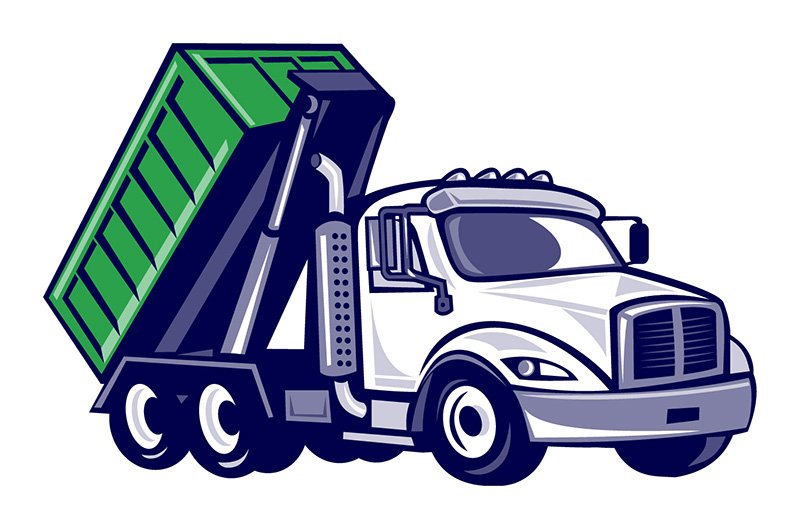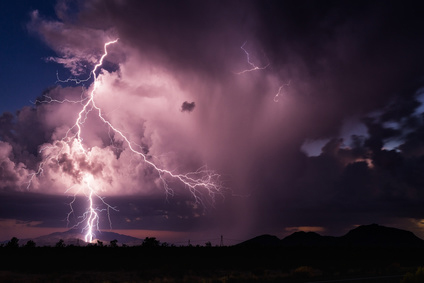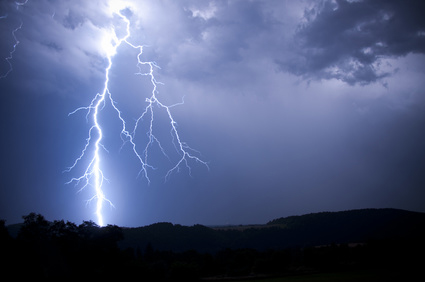Roll Off Rentals
Got a project in mind? R&R is here to help you clean up with roll off container rental
A roll off container rental is a great way to save time and money on a project that’s going to produce waste. You could spend hours of your time and money on gas driving a pickup to the transfer station and back. Or you can have us drop off a container, fill it up, and watch your waste disappear! But what size container is right for your project? Let’s take a look at a couple of different container sizes and what they’re good for.

12 cubic yard roll off container
- A 12 cubic yard container holds just a bit less than four full size pickup beds full.
- 12 cubic yards is enough space for the debris from a smaller renovation project, like a bathroom or small kitchen
- A 12 yard container is great for yard clean outs for a small or medium sized yard
- 12 cubic yards is enough space to accommodate a deck removal, as long as your deck is around 200 square feet or less
- A 12 cubic yard container has room for around 16 square of shingles, or around 1600 square feet. For reference, asphalt and composite shingles typically come in bundles that cover around a third of a square.
- 12 cubic yards is enough space for a basement clean out, or a single car garage
15 cubic yard roll off container
- A 15 cubic yard container holds around as much as 5 full size pick up beds. That’s a lot of driving time saved!
- 15 cubic yards is enough for a larger renovation project, like replacing flooring in a medium-large house
- A 15 yard container can handle a large deck removal of ~250 to ~350 square feet
- 15 cubic yards is enough for a major yard clean out or debris removal on a larger property
- A 15 yard container can hold around 20 square of shingles, or enough to cover around 2000 square feet
Easy loading, easy hauling
All our roll off containers feature side entry for loading of heavy objects. Once your container is full, just give us a call and we’ll make sure your waste is disposed of in an efficient, economical, and environmentally friendly manner.
Call today for a quote!
Hauling Services
This post is the second in a two part series. If you haven’t read part 1 yet, I recommend you do before continuing.
Tips for using and disposing of fireworks safely (continued)
Contact your local fire department, landfill, or waste disposal company to learn about options for safely disposing of fireworks in your community.
If you intend to store unused fireworks for New Years or Independence Day next year, make sure you keep them in a cool, dry place. Don’t store them on top of or near electrical appliances, as a power surge or lightning strike could cause them to ignite.

Safe BBQ waste disposal
Another potential source of fire danger surrounding independence day is BBQ coals and ashes, so it’s important to consider BBQ waste disposal, too. Another 9600 fires start each year because of a household grill, and July is the number one month for fires started by BBQs. Even more frightening, over 16000 Americans end up in the emergency room each year due to injuries caused by their household grills.
Here are a few strategies for using your grill safely:
- Make sure your setup is safe. Clear away any fallen limbs or dry grass from the grill area. Never try to move a grill while it’s hot.
- If you’re grilling with charcoal, be sure only to add lighter fluid to cold coals. Spraying on extra lighter fluid in an attempt to save the fire can cause a flash fire and severe injuries.
- Many BBQ fires are caused by ash that seemed like it went out, only to re-ignite later. Make sure your ash is completely cool before you clean it out, and keep ashes in a fireproof container. If you grill with lump charcoal, you can spread the ashes on your garden or compost pile. If you use briquette charcoal, however, it’s best not to spread it on your garden. Briquette charcoal can contain additives that, while they help it burn easier, are toxic to plants and people.
If you’re in need of fireworks disposal, ash disposal, or disposal of yard or other waste disposal, R&R containers can help. Give us a call today for a fast quote on junk hauling or roll off container services.
Hauling Services
Independence day and fireworks and BBQ safety
It’s nearly the fourth, and everyone is busy with last minute grocery shopping, fireworks buying, and BBQ preparations. But before you fire up that grill and start lighting those fireworks, it’s worth taking a minute to ensure everything will be done safely. Fireworks alone are responsible for a dizzying amount of damage each year, so it’s smart to read up on safe fireworks use and fireworks waste disposal. Check out these alarming statistics from the National Fire Prevention association:
“Fireworks start an average of 18,500 fires per year, including 1,300 structure fires, 300 vehicle fires, and 16,900 outside and other fires. These fires caused an average of three deaths, 40 civilian injuries, and an average of $43 million in direct property damage.” (1)

Let’s take a look at some tips for using and disposing of fireworks safely:
- Before you start lighting your fireworks, make sure you have plenty of fire suppression capability on hand. Hoses, buckets of water, and fire extinguishers are best, but buckets or bags of sand, dirt or mud can be useful too.
- Dedicate one bucket to fireworks disposal. After you’ve used the fireworks, submerge and soak them for a minimum of 15 minutes. Soaking overnight is best of possible. Embers can continue burning deep inside fireworks long after they’ve been lit, creating a potentially dangerous situation if they’re not soaked.
- Be particularly careful with any misfired, dud, or partially fired fireworks. This is the most involved fireworks disposal procedure. Do not approach or handle dud fireworks for at least 20 minutes after lighting. Once it’s safe to approach, soak the duds thoroughly. Then, wrap the soaked fireworks in plastic wrap or a garbage bag before disposal. This step is important because if the dud fireworks are allowed to dry out, they will be a very serious fire hazard.
Check back soon for Happy Independence Day! Learn more about safe fireworks waste disposal and BBQ ash disposal to stay safe this Fourth – Part 2
Source cited:
https://www.nfpa.org/Public-Education/By-topic/Seasonal-fires/Fireworks
Container Services
This post is the second in a two part series on summer thunderstorm cleanup, junk hauling, and roll off container rental. If you haven’t read part 1 yet, I recommend you do before continuing.

Tips for minimizing the impact of summer thunderstorms: (continued)
- Protect your electronics – lightning is a major threat to all the electronic gadgets in our homes. A nearby strike can cause what is known as a power surge, overloading any electronics that are plugged in. Surge protectors offer a degree of protection, but they vary quite a bit in quality and capability. The safest bet is to unplug electronics from the socket if there’s lightning in the area, not just switch off the power strip.
- Inspect your roof – roof damage can lead to immense costs if significant quantities of water get into your home. Inspect your roof for any signs of damage before storm season starts, and inspect it after each major storm. Although roof repairs can be costly, they will end up running a much larger tab if the problem goes unsolved.
Summer storm clean up
Unfortunately, no matter how many precautions we take, no matter how thorough our preparedness, summer storms will always make a mess. After a big summer storm, it’s important to take stock of any damage or debris so you can get it cleaned up and fixed right away – that way it wont lead to bigger problems in the future. Let’s take a look at a couple things to check on after a big storm:
- Downed trees, branches, or power lines – from blocking roads to smashing cars and homes, downed trees cause all sorts of problems. It’s a good idea to check for these first. If you see a downed power line, don’t approach it. Call the utility company and let them handle it.
- Roof damage – wether caused by wind, hail, falling branches, or debris, roof damage can be very costly. Give your roof an inspection after each big storm and take care of any problems you find before you’re dealing with water damage inside.
No matter the size of your summer clean up, R&R containers has all of your junk hauling and roll off container rental needs covered. Need a pile of debris hauled off? Give us a call. Want to re-roof your home in preparation for the summer storm season? A roll off container is the perfect way to dispose of all those old shingles easily and efficiently.
Container Services
Summer thunderstorm season is here
The heat of summer is here, and while that means ice cream and BBQ, it also means that strong summer storms are on the way. When it comes to summer storm preparation, there are some strategies you can employ ahead of time to make your home less vulnerable to storm damage. However, after the big storms roll through, there’s always going to be clean up to be done. R&R Containers offers both junk hauling services for smaller quantities of debris, and roll off container rentals for large scale clean ups.

Thunderstorms cause an immense amount of damage.
Each year, around 16 million thunderstorms occur globally. At any given moment, 2000 thunderstorms are causing injuries or damage somewhere on Earth. In the US in 2016, thunderstorms caused over $3.7 billion in property damage, not including tornadoes, hurricanes or tropical storms, or any associated flooding. (1)
Let’s take a look at some tips for minimizing the impact of summer thunderstorms on your home and property:
- Falling trees – falling trees and tree branches are one of the most common causes of property damage during a summer thunderstorm. They can also be a threat to life and limb, albeit less frequently. Before storm season arrives, inspect trees around your property, paying particular attention to any that might be dead, rotted, infested with insects, or otherwise vulnerable to high winds. Depending on the degree of the problem, the tree may need to be trimmed or removed.
- Drainage – make sure your gutters are clear so they can handle a heavy downpour if one arrives. If there are areas on your property that collect water, now is a great time to improve your drainage before the ponds form. Likewise, make sure all ditches and culverts are clear to keep potential floodwaters moving away from any structures.
Check back soon for Preparing for and cleaning up after summer storms, part 2! In the meantime, check out our page on roll off container rentals.
Source cited:
1 – http://www.nws.noaa.gov/os/hazstats/sum16.pdf






